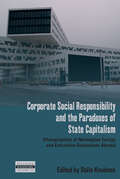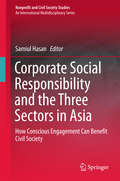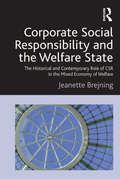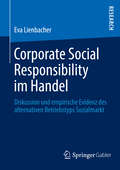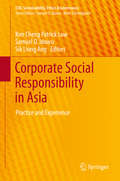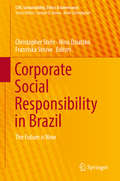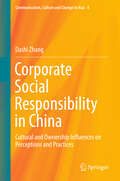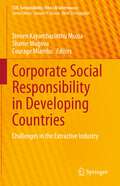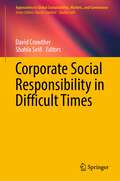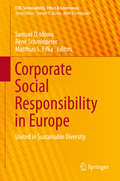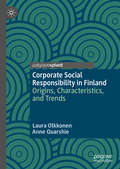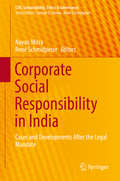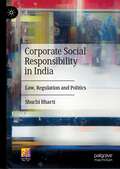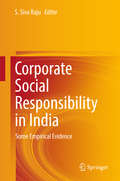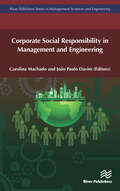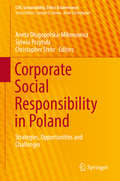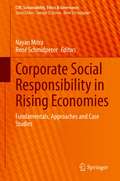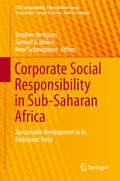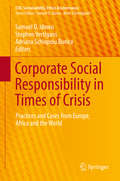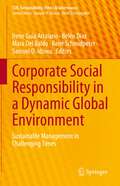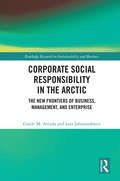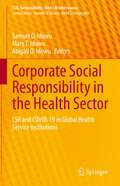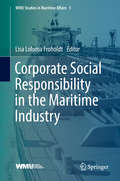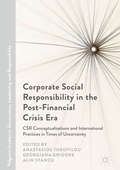- Table View
- List View
Corporate Social Responsibility and the Paradoxes of State Capitalism: Ethnographies of Norwegian Energy and Extraction Businesses Abroad (Dislocations #33)
by Ståle KnudsenThrough a series of case studies in diverse regions of the world, this book explores how transnational Norwegian energy and extractive industries handle corporate social responsibility (CSR) when operating abroad in places such as China, Brazil, and Turkey. With significant state ownership and embeddedness in the Nordic societal model, Norwegian capitalism is often represented as “benign” or ethical. By tracing CSR policy and practice—from headquarters to operations—this volume critically explores the workings of Norwegian corporate capitalism and its engagement with key issues of responsibility, accountability, and sustainability.
Corporate Social Responsibility and the Supply Chain: CSR Collaboration with Suppliers (Routledge Open Business and Economics)
by Monika JedynakDue to the growing importance of global interdependencies, corporate social responsibility has become an important issue both for the business and the entire society. Customers expect corporate social responsibility, and if an organization is insensitive to these issues, it runs the risk of losing its key customers. The interaction and integration of corporate social responsibility and supply chain management have led to the emergence of sustainable supply chain management. This book is a comprehensive study that deals with the subject of collaboration with suppliers, considering the CSR guidelines. It presents new research about suppliers, their importance in supply chains, and in the context of social responsibility and acts as a new source of content that fills the gap in this area. It may be of interest to researchers interested in CSR as well as supply chains, business relations, and, broadly understood, collaboration. It provides knowledge to many recipients including scientists and researchers, advanced students, and graduates.The Open Access version of this book, available at www.taylorfrancis.com, has been made available under a Creative Commons Attribution-Non Commercial-No Derivatives (CC-BY-NC-ND) 4.0 license.Any third party material in this book is not included in the OA Creative Commons license, unless indicated otherwise in a credit line to the material. Please direct any permissions enquiries to the original rightsholder.The publication has been supported by a grant from the Faculty of Management and Social Communication under the Strategic Programme Excellence Initiative at Jagiellonian University.
Corporate Social Responsibility and the Three Sectors in Asia: How Conscious Engagement Can Benefit Civil Society (Nonprofit and Civil Society Studies)
by Samiul HasanThis volume investigates how much governmental control is needed to reign in corporate and business greed and to make business "socially responsible" in Asia. It also questions whether business entities need to be reigned in by the government itself, or if other social, religious, or economic dynamics shape business entities in Asia. Moreover, it looks at how the Asian third sector influences BSR/CSR activities.
Corporate Social Responsibility and the Welfare State: The Historical and Contemporary Role of CSR in the Mixed Economy of Welfare
by Jeanette BrejningOver the past four decades many European welfare states have seen an increasing involvement of the commercial sector in their mixed economies of welfare. One aspect of this development that has yet to be fully understood in social policy analysis is the engagement of businesses to address social problems, such as social exclusion, through activities labelled as 'corporate social responsibility' ('CSR'). Although CSR has gained increasing currency on both national and international policy agendas since the 1990s, it remains a topic which is predominantly researched in business schools and from a business perspective. This book aims to redress this imbalance by focusing on the social aspect of CSR. Based on interviews with a wide spectrum of people who work with CSR professionally in England, Denmark and in the EU Commission, the book argues that when CSR is linked to social exclusion it is a way of renegotiating responsibilities in mixed economies of welfare. The book also offers a comprehensive historical understanding of CSR as it traces the emergence and development of CSR in West European welfare economies as diverse as England, Denmark, Sweden, Norway, Germany and France. By situating CSR within the conceptual framework of the mixed economy of welfare and using Historical Institutionalism as a theoretical perspective to explore and explain the relationship between the welfare state and CSR, this book makes an innovative contribution to critical debates in comparative social policy.
Corporate Social Responsibility im Handel: Diskussion und empirische Evidenz des alternativen Betriebstyps Sozialmarkt
by Eva LienbacherHandelsunternehmen prägen und prägten das Wirtschaftsgeschehen und unsere Gesellschaft seit jeher wesentlich. Neben dem vorrangigen Bestreben, Gewinn zu generieren, verfolgen sie oftmals auch soziale Ziele. Der Beitrag dieser Arbeit ist die grundlegende, deskriptive Aufarbeitung der Forschungsströmung CSR im Handel sowie des alternativen Betriebstyps Sozialmarkt, ein Handelsunternehmen, dass die soziale Zielsetzung über die Gewinnorientierung stellt. Darüber hinaus werden generelle Erkenntnisse zu CSR und der CSR-Kommunikation auf den Lebensmitteleinzelhandel übertragen und konkrete Handlungsempfehlungen für die Marketingforschung und -praxis abgeleitet.
Corporate Social Responsibility in Asia: Practice and Experience (CSR, Sustainability, Ethics & Governance)
by Samuel O. Idowu Kim Cheng Patrick Low Sik Liong AngThis book presents a rich collection of research studies on the theory and practice of CSR in Asia. It includes valuable contributions of practice-oriented researchers from various Asian countries such as Brunei, China, India, Indonesia, Japan, Korea, Malaysia, and Singapore, and from several non-Asian countries, such as Australia, Canada and the USA. The book presents a comprehensive overview of the practice of CSR in Asia. Normally CSR is seen in the Western angles, but here, in this book, Asian philosophies and thoughts are also examined. Touted as the first of its kind, the book also compares Western and Asian perspectives on CSR and presents them in the light of Asian philosophies and thoughts, such as Confucian, Islamic (Koranic), Indian (Vedantic) and other Asian ways of looking at CSR in their own rights and perspectives.
Corporate Social Responsibility in Brazil: The Future is Now (CSR, Sustainability, Ethics & Governance)
by Christopher Stehr Franziska Struve Nina DziatzkoThis book examines the practice of corporate social responsibility (CSR) in Latin America, with a particular focus on Brazil. Drawing on historical developments and theoretical reflections alike, it introduces readers to the state of the art in Brazilian CSR. The authors present a range of regulatory and entrepreneurial frameworks that form the basis for business and CSR activities in Brazil. In a number of detailed case studies from various Brazilian institutions and enterprises, the book provides revealing insights into the practice of sustainable and responsible business conduct in this country. Subsequent chapters show the effects of anti-corruption laws, which have since informed corporations’ compliance agendas, and discuss recent, massive corruption scandals. Generally speaking, the book provides a highly informative and practice-oriented resource that successfully reconciles an ostensible contradiction – corporate social responsibility and Brazil.
Corporate Social Responsibility in China: Cultural and Ownership Influences on Perceptions and Practices (Communication, Culture and Change in Asia #4)
by Dashi ZhangThis book explores how the traditional Chinese culture and business ownership influence corporate social responsibility in China. By comparing state-owned enterprises, private companies and multinational companies, it shows how corporate social responsibility is perceived and practiced at the corporate level in these companies. It also studies how intertwined company practices and the Chinese culture are, and how this relationship affects the business environment in China. Further, it highlights the value of economic factors in corporate social responsibility, and the influence of Chinese philosophy on corporate ethics. It is a valuable tool for researchers and academics wishing to understand the dynamics of corporate social responsibility in China and discover the significant influencing factors in China's business arena.
Corporate Social Responsibility in Developing Countries: Challenges in the Extractive Industry (CSR, Sustainability, Ethics & Governance)
by Shame Mugova Steven Kayambazinthu Msosa Courage MlamboThis book examines corporate social responsibility theories and models in the context of developing countries. The developing countries are amongst the poorest countries of the world despite vast natural resources. The natural resources are mismanaged, proceeds are misappropriated, corruption and conflict are centered on resource control. Governments and Multinational Corporations (MNCs) are at the centre of the controversy of corporate social responsibility (CSR) in the affected countries. Moreover, the lack of systems, procedures and legislation to enforce CSR has led to environmental degradation and a decline in business ethics and morality. This book analyses Corporate Social Responsibility in developing countries with specific reference to the extractive industry by integrating academic and industrial perspectives. It will be of interest to researchers in the field of CSR, as well as for management professionals.
Corporate Social Responsibility in Difficult Times (Approaches to Global Sustainability, Markets, and Governance)
by David Crowther Shahla SeifiIt has been fairly traumatic for everyone and every organization over the last couple of years as we have had to deal with the coronavirus pandemic. It has certainly been a shock to the economic system of the world from which many are still recovering. Equally it has affected social systems and the environment, the effects of which are still being felt and will be felt for some time to come. In addition, there has been a fairly general economic crisis around the world as people struggle and adapt to the new environment. Certainly, there have been and will be changes which are likely to become permanent. While recovering from one crisis however another is becoming more significant as climate change and its effects start to become ever more apparent. So, it seems inevitable that difficult times will continue into the future. This book therefore sets out to examine aspects of the changes to corporate and institutional behaviour which have come about by the difficult times of needing to deal with past and future crises. The international origins of the contributors to this volume make this very original, taking some of the best ideas from around the world. This approach is based on the tradition of the Social Responsibility Research Network (SRRNet.org), which in its 20-year history has sought to broaden the discourse and to treat all research as inter-related and relevant to business. This tradition has always been to explore the subject widely and to seek relevant solutions, while also sharing best practice.
Corporate Social Responsibility in Europe: United in Sustainable Diversity (CSR, Sustainability, Ethics & Governance)
by Samuel O. Idowu René Schmidpeter Matthias S. FifkaThis book explores the current state of Corporate Social Responsibility (CSR) in 24 European nations, examining the state of the development and practice of CSR and sustainability for organizations in these countries. The common denominator for all of the book's 25 chapters is a management perspective rather than an ethical discourse. The book therefore represents a comprehensive survey of initiatives and activities in the field of CSR and provides a wealth of complete cases and examples for different approaches to sustainable and responsible management practice. The book also reviews the relevant political and governmental guidelines and frameworks for organizations, both on a national and a European level. Europe has taken a leading role in the promotion and implementation of CSR. This book showcases how, through CSR, enterprises can significantly contribute to achieving the European Union's treaty objectives of sustainable development and a highly competitive social market economy.
Corporate Social Responsibility in Finland: Origins, Characteristics, and Trends
by Laura Olkkonen Anne QuarshieThis book introduces a Finnish approach to corporate social responsibility (CSR) and embeds it within a broader discussion on the Nordic roots of business responsibility and stakeholder thinking. The first part of the book traces the origins of Finnish CSR from paternalism at the beginning of industrialization to the start of the welfare state. The second part discusses the characteristics of Finnish CSR in light of the cultural and societal context and structure, and the third part introduces current trends and challenges. Each section of the book includes case examples that illustrate Finnish CSR from different perspectives. The book will be of use to scholars and students with an interest in the Nordic approach to CSR.
Corporate Social Responsibility in India: Cases and Developments After the Legal Mandate (CSR, Sustainability, Ethics & Governance)
by René Schmidpeter Nayan MitraThis book provides a comprehensive overview of Corporate Social Responsibility (CSR) in Indian corporations following the 2013 legal mandate on corporate spending of profits for CSR. Bringing together authors hailing from diverse walks of life, the book pursues a 'hands-on' approach, with real-world case studies and examples that help the reader feel the dynamic pulse of India immediately after the ratification of the CSR mandate in the Companies Act, 2013. The Act is expected to affect over 16,300 companies with an estimated flow of approximately 200 billion Indian rupees into the economy every year, thus shaking the foundations of business and society and impacting the country at multiple stakeholder levels. As a result, India is likely to become the birthplace of social, economic, and environmental transformation through financial investments in CSR! In order to insightfully reflect on this transition, this book has been divided into three parts. The first part presents the CSR mandate and its implications, while the second focuses on its implementation and the third part provides a view on the way forward. The book helps to reveal the various layers of CSR in an emerging economy like India and is expected to spark debate, discussion and research among policy-makers, consultants, academics, practitioners and other stakeholders the world over, which will further expand its contribution to CSR literature and open up new vistas in CSR research. "This is indeed a first of its kind book and marks a watershed in the journey of CSR. It is an extremely important contribution to the body of knowledge in the area of CSR and Corporate Goverance in emerging economies that is driven by a completely different set of challenges, opportunities and requirements from that of developed economies. " Dr. Bhaskar Chatterjee, Director General & CEO, Indian Institute of Corporate Affairs
Corporate Social Responsibility in India: Law, Regulation and Politics
by Shuchi BhartiThe book explores how the influence by the corporate sector in the economic interactions globally leads to the international governance framework pertaining to CSR, that is primarily based on soft law attributes. Such international soft law regime uniquely influences the way the legal regime around CSR has shaped up in India. Through innovative methodology, the analysis of regulatory space and instruments and the structural framework construe the relationship between state and corporate sectors. It is necessary to investigate the two-fold relationship of state and corporate actors. The book takes up a regulatory, institutional and socio-political investigations through studying the case of CSR in India in the backdrop of the transformations taking place in national arena, its international inspirations and resulting regulatory model that evolve. How the existing regulatory space is affected? What are the implications on the regulatory instruments? The pursuit of the answers would also involve investigation of questions as to how the state-corporate relationship constructed, construed and conducted post state’s ratification of CSR. What are the reasons of such changes? What implications do the role of politics and corporate strategies have on the renewed interest in CSR? The book deals with these aforementioned aspects. This scholarly work synthesizes political, economic and legal aspects of the role of the state and corporate sector with narrowly defined focus of CSR which has the ability to provide a comprehensive broad-brushed account of the larger framework.
Corporate Social Responsibility in India: Some Empirical Evidence
by S. Siva RajuThis book presents the authors' recent field experiences of corporate social responsibility (CSR) activities in different regions of India. It also demonstrates how social auditing and stakeholder mapping help analyze the impact that particular individuals or groups may have on the functioning of any company in an area. CSR is a rapidly growing area of research and activity, especially in developing countries like India. An increasing number of companies are realizing their own social responsibility, given that they work within societal networks. As a result, any initiation or expansion activity they carry out in society impacts the communities around them. Given the newness of the field, the work on CSR in India is still in the initial stages. Most importantly, there is a need to highlight issues concerning CSR activities using sound methodologies and scientific data. A database comprising qualitative and quantitative approaches collected by tracking CSR activities is invaluable. Further the scientific data is vital to fully understand CSR, and in turn helps in designing appropriate and effective interventions for improving community members' quality of life. Accordingly, the stakeholders associated with CSR need to have a sound knowledge of how to conduct studies related to baseline data generation, community needs assessments, community profiling, stakeholder mapping, social impact assessments, monitoring and evaluation, as well as the social auditing of CSR projects and other related issues. This book aptly covers these issues and offers supporting empirical evidences from the field.
Corporate Social Responsibility in Management and Engineering
by Carolina Machado; João Paulo DavimReferring to an organizations responsibility for their impact on society, corporate social responsibility (CSR) is greatly relevant for the competitiveness, sustainability and innovation in the management and engineering arena of organizations, and the economy worldwide. Taking in account its these concerns, Corporate Social Responsibility in Management and Engineering covers the issues related to corporate social responsibility in management and engineering in a context where organizations are facing, day after day, high challenges for what concerns issues related to their social responsibility. The book looks to contribute to the exchange of experiences and perspectives about the state of the research related to CSR, as well as the future direction of this field of research. It looks to provide a support to academics and researchers, as well as those that operating in the management field need to deal with policies and strategies related to CSR.
Corporate Social Responsibility in Poland: Strategies, Opportunities and Challenges (CSR, Sustainability, Ethics & Governance)
by Christopher Stehr Aneta Długopolska-Mikonowicz Sylwia PrzytułaThis book examines the development and adoption of corporate social responsibility (CSR) in Polish businesses and social and environmental organizations, and analyzes the corresponding impact at the strategic and operational level in these fields. It presents the status quo of CSR in Poland from three main perspectives: The first presents theoretical works based on current research and recent advances, while the next takes a closer look at empirical findings in the different fields of CSR (e.g. finance, reporting, law) and presents best practices from major international companies operating on the Polish market. Lastly, it presents a range of case studies from small and medium companies and NGOs in Poland and gives an outlook on the future development.Readers will benefit from an in-depth discussion of the opportunities and challenges that businesses and organizations in Poland are currently facing with regard to traditional national values and the influx of new cultural and social dimensions and patterns produced by international businesses entering the Polish market. Taken together, the lessons learned, case studies and snapshots of the latest developments provide a comprehensive overview of the state of the art of CSR in Poland, as well as a blueprint that can be applied to other Eastern European countries.
Corporate Social Responsibility in Rising Economies: Fundamentals, Approaches and Case Studies (CSR, Sustainability, Ethics & Governance)
by René Schmidpeter Nayan MitraEmerging economies arguably have different socio-fiscal dynamics compared to developed economies. On one side they have the need for corporate interventions in national development, on the other hand, they do not have enough research to support the agenda. In recent times there has been a conscious effort to legislate Corporate Social Responsibility (CSR) in some of these countries in order to bring about sustainable development. Yet, it is this legislation, which is debated among many others.This book provides its readers with a comprehensive interpretation of the various CSR perspectives in emerging economies through academic research and case studies from practice. It not only points out the challenges, the debates, but also the dynamics of implementation and the impact of such CSR spent. This book therefore is targeted both towards academics as well as practitioners in an attempt to bring about an active academic-industry interface as CSR as a management function is part of dynamic social science.
Corporate Social Responsibility in Sub-Saharan Africa: Sustainable Development in its Embryonic Form (CSR, Sustainability, Ethics & Governance)
by Samuel O. Idowu Stephen Vertigans René SchmidpeterThis book provides a comprehensive overview of corporate social responsibility and its development in Africa. It provides in-depth studies on 11 sub-Saharan countries, demonstrating that corporate social responsibility is forming and going through different stages of metamorphosis in the continent. Though corporate and individual attitudes towards sustainability in Africa still leave a lot to be desired, this book showcases how things are rapidly changing for the better in this regard. It demonstrates and provides evidence for the fact that corporate social responsibility contributes significantly to the way sub-Saharan African economies are being transformed, with service sectors expanding, commercial activities diversifying and industrial bases growing through the initiatives of small, medium and large organizations and innovators supported by widespread higher-education program rollouts. The book highlights how progressive and wide-ranging CSR approaches have emerged, and how much they differ from the obsolete approaches of the past, which promulgated negative stereotypes, marginalized communities and positioned them as victims or beneficiaries of development.
Corporate Social Responsibility in Times of Crisis: Practices and Cases from Europe, Africa and the World (CSR, Sustainability, Ethics & Governance)
by Samuel O. Idowu Stephen Vertigans Adriana Schiopoiu BurleaThis book explores national and transnational companies' Corporate Social Responsibility (CSR) activities in times and settings in which they are confronted with economic and social challenges and analyzes these situations, ranging from the financial crisis to fourth generation sustainability. Presenting a number of different cases from various parts of Europe, North America and Africa, it showcases how companies respond to the challenges of the development, consultation, implementation, integration, measurement and consolidation of CSR. Further it specifies how these corporations deal with uncertainties over corporate and financial resources, global financial stability and growing evidence for climate change. The book describes CSR adaptation under challenging circumstances and argues for the strategic and operative legitimation of Corporate Social Responsibility in times of crisis.
Corporate Social Responsibility in a Dynamic Global Environment: Sustainable Management in Challenging Times (CSR, Sustainability, Ethics & Governance)
by Samuel O. Idowu René Schmidpeter Mara Del Baldo Irene Guia Arraiano Belén DíazThis book highlights the latest research on responsible business and its practical implications for the economy, society, academia, and politics. It presents selected contributions from respected scholars and experts who have conducted international research on corporate social responsibility, sustainability, ethics, corporate governance, finance, and responsible investing. The book examines the spreading and enhancement of CSR and sustainability at the micro, meso, and macro levels, especially in light of their increased relevance following the recent pandemic. Taken together, the results of the empirically and theoretically based contributions offer a unique and multi-faceted perspective on current global trends and expected developments in this area. They cover a wide range of contexts and situations, helping readers expand their knowledge and drive effective change to tap their organizations’ full potential.
Corporate Social Responsibility in the Arctic: The New Frontiers of Business, Management, and Enterprise (Routledge Research in Sustainability and Business)
by Gisele M. Arruda Lara JohannsdottirCorporate Social Responsibility in the Arctic considers the new trends and frontiers of Corporate Social Responsibility (CSR) studies that are shaping the future of global business strategy and ethics. This book systematically approaches the CSR framework of internal and external factors and their impact on the social responsibility of businesses within the sensitive environment of the Arctic. It presents traditional and contemporary models of CSR through case studies of the eight Arctic nations and explores the debates concerning social responsibility and ethical dilemmas related to social and environmental aspects of business operations, society, and ecosystems. Arruda and Johannsdottir also review approaches for engaging stakeholders in social responsibility, socio-environmental standards, and sustainability, according to frameworks like the UN Sustainable Development Goals, the UN Global Compact, the OECD Guidelines for Multinational Enterprises and the Global Reporting Initiative, but also according to the new CSR strategy in the Arctic based on circular economy, blue economy, smart specialization, knowledge-intensive entrepreneurship, and new parameters of education. Overall, this book examines the ways in which the changing climate and rich natural resources of the Arctic provide unique opportunities and challenges for businesses and societies. This book will be of great interest to students and scholars of CSR, sustainable business, and business ethics.
Corporate Social Responsibility in the Health Sector: CSR and COVID-19 in Global Health Service Institutions (CSR, Sustainability, Ethics & Governance)
by Samuel O. Idowu Mary T. Idowu Abigail O. IdowuThe pandemic that struck in late 2019 - the coronavirus, commonly referred to as COVID-19 - affected every country in the world. This book examines how the pandemic has impacted healthcare institutions worldwide, and focuses on the international experience of COVID-19 in terms of healthcare delivery since 2019 and today. It highlights how healthcare facilities around the world have managed and continue to manage their obligations to their citizens. The book’s goal is to improve our understanding of the many negative and positive impacts of the pandemic on various aspects of our lives, including the health aspect, and how healthcare institutions could expand their ability to manage similar pandemics in the future without seriously compromising their ability to address other, regular health issues. At the same time, it takes a closer look at CSR, sustainability, ethics, and governance issues related to the pandemic, as well as current CSR practices in each of the countries reviewed.Given its scope, the book will be of interest to a broad readership including researchers, practitioners, and students concerned with the pandemic’s societal and public health implications.
Corporate Social Responsibility in the Maritime Industry (Wmu Studies In Maritime Affairs Ser. #5)
by Lisa Loloma FroholdtThis book addresses the environmental, legal, social, and economic aspects of corporate social responsibility in the maritime industry. It discusses the voluntary aspects of the CSR concept and how the lines between informal and formal rules are merging and becoming fuzzy. Further, it shows how regulation is enhancing responsibility and sustainability in the maritime industry.The book gathers the experiences of the WMU, IMO, UN and public and private actors in developing and developed countries in the maritime industry.
Corporate Social Responsibility in the Post-Financial Crisis Era: CSR Conceptualisations and International Practices in Times of Uncertainty (Palgrave Studies in Governance, Leadership and Responsibility)
by Anastasios Theofilou Georgiana Grigore Alin StancuBringing together normative and instrumental CSR conceptualizations, practice based examples and international case studies, this edited volume brings together important contributions on the conceptualizations of CSR post financial crisis. Including coverage of a variety of practices in developing and developed contexts, industry-specific activities, business ethics and sustainable development issues, Corporate Social Responsibility in the Post-Financial Crisis brings together a variety of perspectives to provide knowledge and understanding across contexts.
